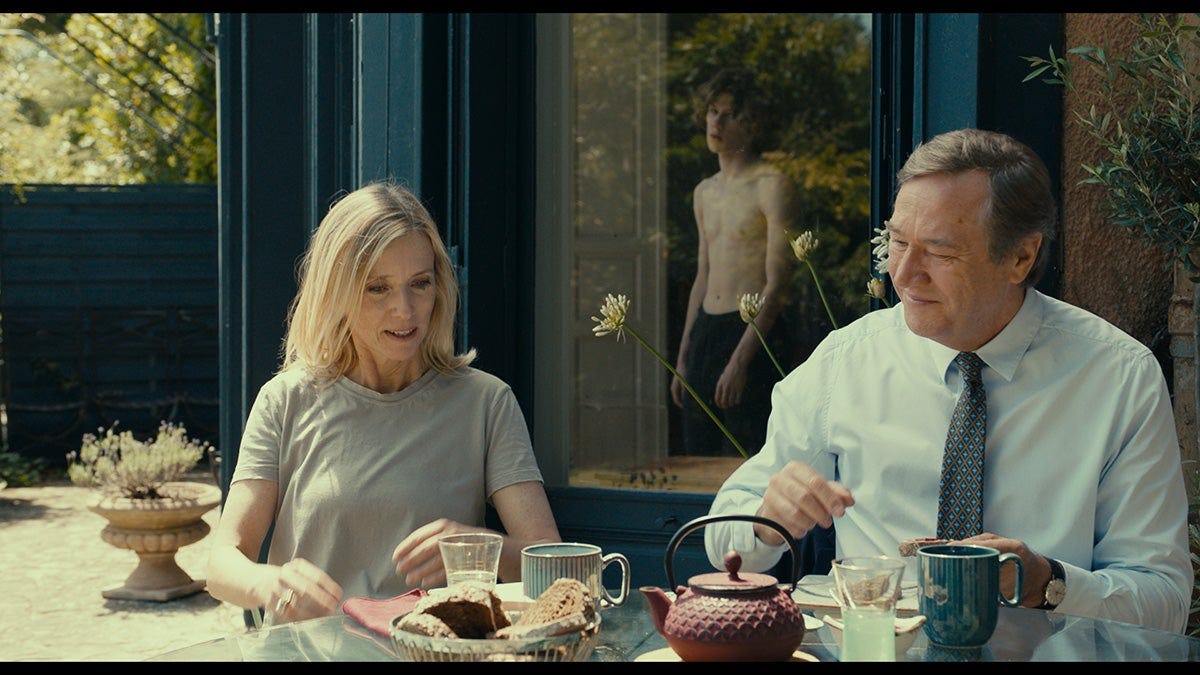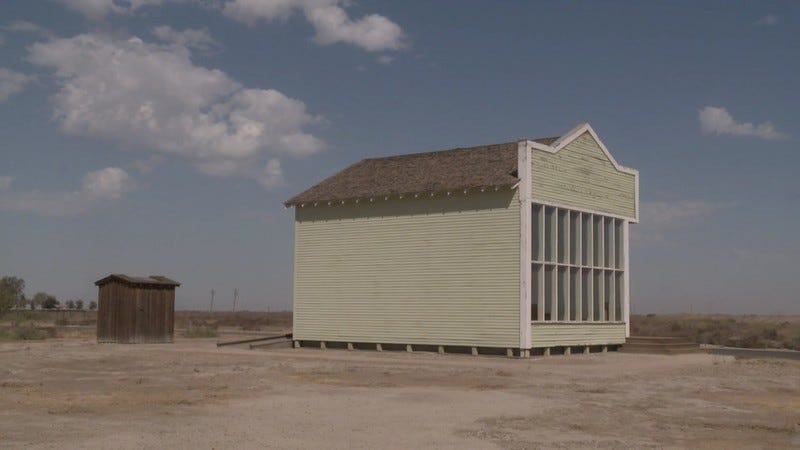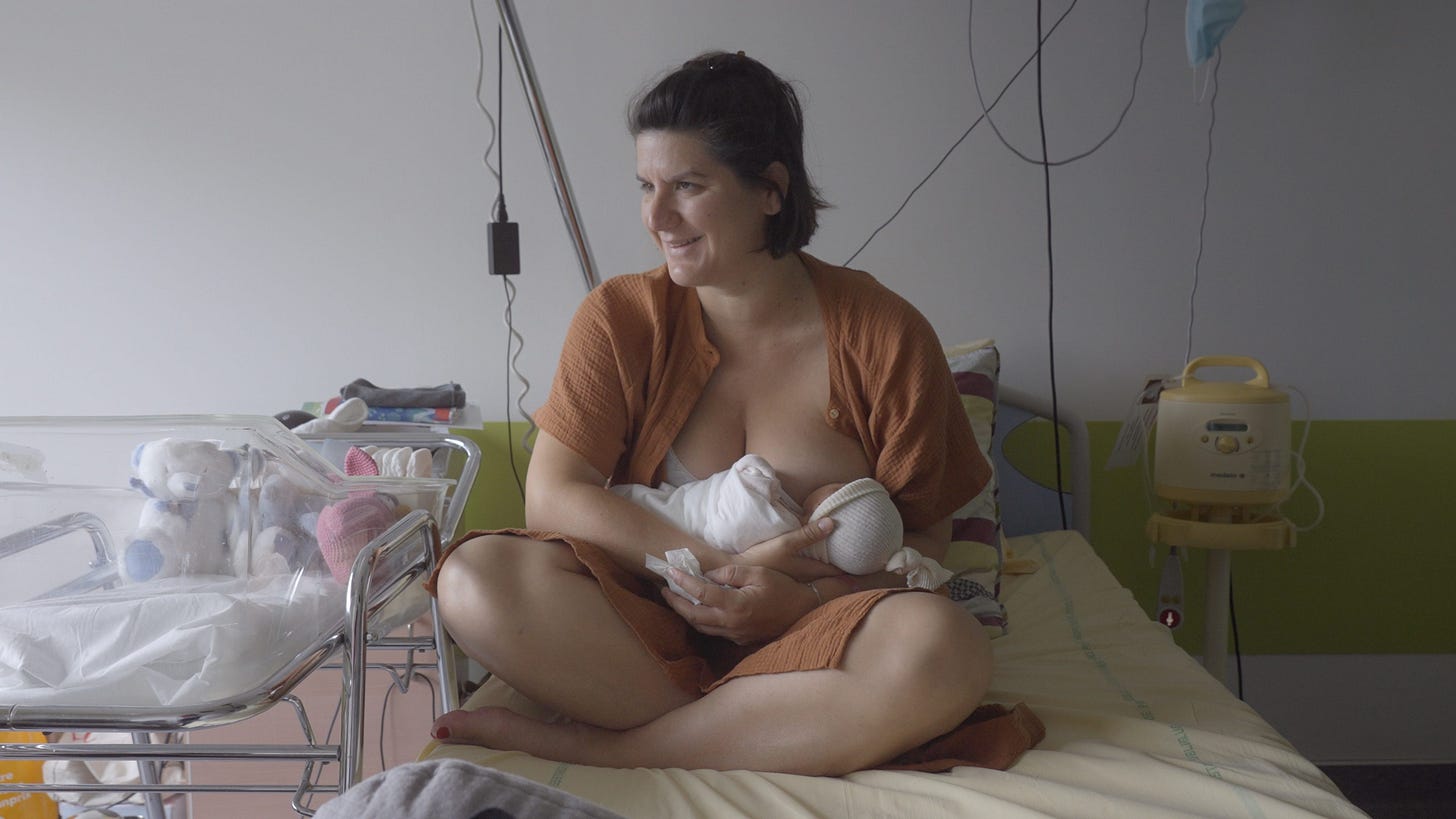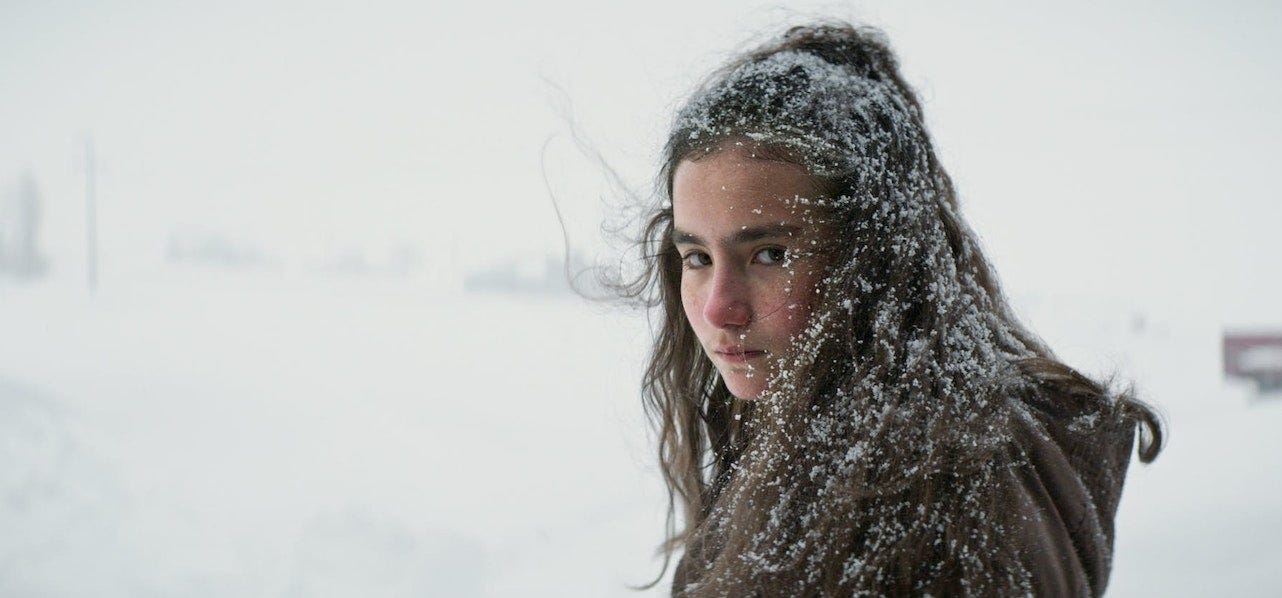The Best Films of 2023
PLUS: cool movie moments, the state of my cinema-going being as the year closes, and more
2023 was by and large a disappointing year for “the movies”. The Strikes™️ and studio tax fraud schemes pushed back (or outright cancelled) many of my most anticipated big budget studio pictures (Dune: Part 2 and The Bikeriders chief among them), and the ones that did see releases stunk! In the indie sphere, we went another year without so much as a whisper of a new docu-hybrid feature length film from Pedro Costa (although his shorts that played at NYFF are, I hear, pretty okay), Mike Leigh’s new film has no news to speak of beyond a single headline in an obscure Bri’ish trade paper which claims the film has been cast, and the festival circuit was dominated by the emergence of the Weerasethakul pastiche as the new style du jour for government-funded films (a development that should excite a big Weerasethakul-head like me, but left me mostly cold and bored and appreciating Weerasethakul’s unique genius even more than I already do), and several big-name directors made some bad-to-mid movies. You can read all about this, and more, in my forthcoming Worst Films of 2023 list.
Disclaimers: I have yet to see seen Anatomy of a Fall or the new Wiseman. The Wiseman would probably make the list, Anatomy probably would make the ‘favorite things’ portion.
But First:
My favorite things from films not on this list:
The look, feel and sound of Eileen
Eileen is not a great film, it’s barely even a good film— Oh, you write your books and (presumably) screenplay adaptations of those books as single drafts? Honey, we can tell!— but it is one of the best looking, best feeling and most sumptuous films I saw all year, perfectly evoking not only the films of the 1950s and ‘60s, but the feeling of early ‘90s films set in the 50s as well. Add a good cooking ass, Carter-Burwell-at-his-best, thrillery xanny-jazz score and my favorite opening/closing credits of the year and you have a movie that is so much fun to watch, even if it’s mid.The pre-interval scene from Dasara
Dasara, starring “Natural Born Star Nani”, was arguably the biggest Tollywood film this year. It had one good song, one okay song, a sloggy romance and a borderline-incomprehensible social message, but the pre-interval scene, a footchase where group of corporate mercenaries hunts down and beheads a bunch of scrappy drunkards who beat them at cricket (I think this is what happens, it was a while ago and i took a big-time edible), was one of the most intense, heart-pounding sequences in any movie I saw this year.
The first half of No Hard Feelings
This Jennifer Lawrence vehicle was hailed as a return to form for R-Rated mid-budget studio comedies. Was it? Not really, but it was better than the other lauded R-Rated mid-budget studio comedy that came out this year… The back half falls really flat and the direction is not particularly inspired, but J-Law is so charismatic and the jokes are so funny that I walked away feeling really good about this picture.
Charles Melton in May December
I was colder on May December than most (more December than May, you might say) — it doesn’t really go far enough in terms of bad vibes or thematic interrogation, but Melton, who I loved on Riverdale (I’ve seen five of the seven seasons), shows real chops, turning in a devastatingly human, insanely specific performance that grounds and elevates and even saves a movie that would otherwise be an interesting, too-arch failure.
The ending of Afire
Fran from Fran Magazine turned me on to Christian Petzold early in our joint career as a heterosexual couple who watch a lot of movies— one of our first dates was seeing Undine at Lincoln Center. I liked Undine, and really liked Phoenix, but Transit blew my mind and instantly became one of my favorite World War II movies of all time. Afire is definitely in the “lesser Petzold” camp— for every second it cooks there is another where it is lost in the sauce, adrift without a current. That said, the finale is, quite literally, an absolute scorcher, one that justified the films whole existence and left me pleasantly unmoored.
And now, without further ado….
The Best Films of 2023
14. Magic Mike’s Last Dance (Dir. Soderbergh)
Incomprehensible movie with weird vibes, an annoying kid, bad music, baffling camera angles, ugly color grade, weird sound mix, a major step down from the first two in the series?
Look, I won’t defend this to anyone who didn’t like it, but Magic Mike’s Last Dance is another masterful, low-key chewy turn from America’s preeminent stoner filmmaker.
13. God is a Bullet (Dir. Cassavetes)
Nick Cassavetes’ latest film is not good. It’s really, really bad actually, and it’s through this awfulness that Cassavetes’ genre bona fides shine. The film, starring Nikolaj Coster-Waldau, Maika Monroe and Jaime Foxx, is a love letter to 1970s exploitation and grindhouse horror films. You’ve seen this kind of thing before perhaps, but what separates God is a Bullet from the boring film grain and flannel of something like, say, X by noted hack and High Fantasy Enemy™️ Ti West, is that Cassavetes’ film is set contemporarily and shot in a contemporary low budget style. He understands that there is more to these films than 16mm film stock and bright red blood; he’s not just a student of surface-level schlock like The Texas Chainsaw Massacre and Messiah Of Evil, but of films like Copkillers, Criminally Insane and I Drink Your Blood, ugly films with ugly characters and ugly politics, not just bloody and campy but grim, nasty, cruel. The result is that God is a Bullet feels more like forgotten grindhouse than anything else from the past twenty odd years that has sought to emulate the 70s exploitation style. It’s gritty, ugly, stupid, misogynistic and truly mean-spirited, refusing to sanitize it’s dime store paperback origins or drive-in double feature influences, and it’s the best Rob Zombie film since Halloween II.
12. Dungeons & Dragons: Honor Among Thieves (Dir. Daley, Goldstein)
In the 20 years I’ve been playing Dungeons & Dragons, the general consensus among fans of the game was that a true D&D adaptation was an impossible task. There was simply no way you could actually narrativize the spirit of the game— the wacky schemes, the failed dice rolls, the tonal imbalance that works at a gaming table but not in a book or movie— it simply wouldn’t work. A D&D movie would either be a lore-dense film set in the Forgotten Realms (or Greyhawk or Ravenholm or whatever) that didn’t capture the essence of playing D&D at a table, or it would have to be some kind of meta type picture about a group of people playing D&D. This line of thought was boosted by the charmless, annoying, utterly contemptible Critical Role adaptation from Amazon Studios, so I was shocked and pleasantly surprised when Honor Among Thieves proved to not only be a perfect adaptation of Dungeons & Dragons actual play, but a delightful movie that featured a three foot tall Bradley Cooper and sated my carnal lust for fucked up, goofy puppets.
11. Razzennest (Dir. Grenzfurthner)
Razzennest, Grenzfurthner’s followup to his brilliant 2021 film Masking Threshold (one of the all-timer edible+headphones movies) is a film about which I can tell you nothing, and as a result this is probably going to be the shortest entry on this list. To experience everything it has to offer, you must go into your viewing as blind as possible. I can tell you that it is shocking, funny, utterly unique, and has the best long-game joke payoff in any movie I’ve seen in the last five years. I left the theater with an elevated heart-rate in a state of absolute shock, laughing like one might after narrowly avoiding a car crash or doing a backflip for the first time. The most interesting no-budget filmmaker out right now.
10. TMNT: Mutant Mayhem (Dir. Rowe)
Wait no actually this is the shortest entry on this list, because I don’t have anything interesting to say— I just had a lot of fun with this movie. The chemistry, the fight scenes, the clever animation, the Bronx Antics reference… people called this a Spidverse rip-off, but I think that really sells short just how visually creative this film really is.
9. Maestro (Dir. Cooper)
The lead-up to Maestro was full of tension and madness. Would the film be good? Theoretically it could be, I guess, but the bad prosthetic set pics, maudlin first trailer, insanity of its premise, its starring of an actress I don’t really like… suffice to say my expectations were low, though my hopes remained high. Perhaps these low expectations ultimately served the film’s best interests, because I was mostly really floored! It looks gorgeous and expensive, the prosthetics are utterly convincing (even if his voice is not), the music is great (duh), and it’s full of romance and wonder. I will even go so far to say that the six minute sequence of Cooper-As-Bernstein conducting the finale of Mahler #2 is the single most vibrant and moving sequence I saw this year. The rest of the picture doesn’t reach those heights, but it is still rapturous, charming, and magnetic. I pray Cooper wins an acting Oscar for this film, not because he deserves it (the performance itself is fine, not great), but because I want him to retire from acting to spend more time behind the camera. He is the most exciting Actor-Director to come out of Hollywood proper since Clint Eastwood.
8. The Eight Mountains (Dir. van Groeningen, Vandermeersch)
Speaking of gorgeously shot and deeply moving conventional narrative dramas… The Eight Mountains is basically a perfect film to tell your parents to watch (and, depending on how good your relationship has historically been with your parents, to watch with them). It’s beautiful to look at, brought to life by two great performances, manages to gingerly explore platonic male friendship without leaning on war or homoeroticism or trauma to make it more interesting. Beautiful and understated and luxurious and quietly epic, The Eight Mountains pulls off a real feat in making first-person voicover work in an emotionally weighty bildungsroman without feeling saccharine. It made me laugh, it made me cry, it made me think about my life… what more could you possibly want from a film based on a foreign bestseller that won an audience award at Cannes? Of all the films on this list that I think idiots with bad taste would also like, this is definitely the best of them. I can only imagine the kind of deep emotional catharsis that would come from watching this on a long ass flight and having to stifle your sobs as you bring your seat-back up and return your tray-table to it’s upright and locked position.
7. Killers of the Flower Moon (Dir. Scorsese)
In the month-and-change since having seen KotFM, I have soured on the ending, which I would describe as Wes Anderson-esque, and I don’t know if Scorsese’s obsessions with redemption and the ultimate fate of bad men’s souls is the best lens through which to tell this true story, but ultimately this is just a triumph, a bleak epic with bitter, pitch-black humor and a veritable smorgasbord of liberal male alt-country stars in walk-on roles. Lily Gladstone shines, of course, proving what Reichardt heads have known for years: She’s heavyweight talent, the type of performer who transcends traditional notions of star power, like Phillip Seymour Hoffman or Daniel Day Lewis. Marty is still the king, and he’s two-for-two with these miserable four hour exegeses on the films he’s made over the last fifty years. Here’s hoping and praying he gets to make another one before the clock runs out.
6. Passages (Dir. Sachs)
Tender, funny, brutal, and really, truly sexy, Passages is grown-up picture, one that understands that you can’t interrogate horniness unless you yourself are horny. It’s easy to make jokes (who wouldn’t blow their whole shit to smithereens for a crumb of that Exarchopoulos pussy?), but as much fun as it is to riff on the destructive power of the most annoying person you know discovering they’re bisexual in their thirties, Passages is a serious, cypheric, film, one whose meaning will undoubtably shift with each viewing. It’s one of the best, of the best kind of french film, cool, erotic, socially ambiguous and metafilmic, asking all the right questions to get all the wrong answers, and it does it all without descending into the pitfalls of “froggy tricks” that make every third Claire Denis and basically every Godard film so fucking annoying— probably because its director isn’t french!
5. Last Summer (Dir. Breillat)
Speaking of “erotic, classically french-type drama”, Catherine Breillat’s ancient ass came out of retirement to remake a great little dutch thriller from 2019 called Queen Of Hearts. I really liked, though did not love, Queen Of Hearts, a bold and chilly film concerning a Lawyer who defends sexual assault victims beginning a tumultuous affair with her husband’s troubled 17-year-old son that proudly wears its Haneke influence on its sleeve. Combining three time honored french past-times (incest, hebophilia, cheating), one might expect Breillat, whose brilliant-but-fucking-miserable masterpieces Fat Girl and Bluebeard contain some of the worst vibes in any movie you could ever watch ever, to ramp up the evil already present in the source material. Going into Last Summer, I was bracing myself for something in line with the Breillat I know— Imagine my shock when this turned out to be a romantic comedy about two absolute bozos who find love against all odds. I truly cannot overstate just how funny this movie is, but to give you an idea of the level this film is operating on, (small spoilers ahead), when Anne (Lea Drucker) and Theo (Samuel Kircher) hook up for the first time, Theo is watching a “french anime” called Mars Express, a real film that really released earlier this year that, get this, fucking STARS LEA DRUCKER. This is the best kind of remake, one that not only builds something new, but something wholly contradictory to it’s source material. An absolute pleasure and the funniest movie of the year.
4.Fallen Leaves (Dir. Kaurismäki)
I go way back with the films of Aki Kaurismäki. They’re like a comfort food I got burned out on and stopped eating for years. The Match Factory Girl, The Man Without A Past and La Havre were all essential bedrocks to my tastes when I started to meaningfully explore foreign and arthouse cinema, so it was a joy to see that my boy had knocked it out of the park with another playful little dramedy. If you’ve seen any of his previous films, you’ll know what to expect: deadpan humor, subtle stylization, proletariat leads, simple story, winks to golden-age cinematography... It’s nice stuff, folks! Whenever I go back to visit a filmmaker I loved when I was 19, I’m always worried that I will have outgrown them, the magic lost, never to be recovered. I basically hate Wong Kar-Wai now, and was worried that I would think similarly of Kaurismäki. Have no fear, he is still rocking his niche, and, thanks to Mubi going hard on their distribution for this film, this looks to be his most widely seen and discussed picture yet. If Fallen Leaves was your first Aki, I promise you will not be disappointed by the other films he’s made.
No spoilers, but you simply will not believe what film they’re watching on the poster for this movie.
3. Allensworth (Dir. Benning)
If you only see one film about white America systematically fucking over and destroying the lives people of color who dared to find prosperity in a country hostile to their free existence made by an ancient white man who is an indisputable giant of American Independent Cinema, I would hope it’s ultimately this one. Allensworth feels like a culmination of Benning’s entire career: the explicit politics of Landscape Suicide and 11x14, the abstract historiography of Deseret and the California trilogy, the structuralist duration of Ten Skies, Thirteen Lakes, RR and Easy Rider (Remake), and the personal foregrounding of his digital films (especially Stemple Pass and L. Cohen, as well as the internet trilogy), all of it is present in Allensworth, and the result is his best film in a decade.
Consisting of twelve static shots of Allensworth, CA (the first incorporated black community in the state), the film is a mystery you can’t resolve, a polemic with hidden targets, and the slow reveal of the “mystery” of Allensworth (not that the town was sabotaged and forced into abandon by white-led county governments, but what it has become since) makes for a richly ludic watch.
2. Our Body (Dir. Simon)
Claire Simon’s sprawling free-form documentary consists of a series of doctor’s appointments and medical procedures. They all take place in the same hospital, and the patients are all women, or else have vaginas and ovaries. It’s a simple conceit that, when combined with the films mammoth runtime (168 minutes), pays off with huge dividends. Despite the ostensibly monotonous structure, the film never feels like a chore. It is vibrant and full of life; it is funny and sad, often both simultaneously, a tapestry of women’s bodies and afflictions, of triumphs and setbacks. It is fiercely political and deeply brutal and life-affirming, all in ways you would and wouldn’t expect. A young trans patient, his mother and his doctor find their treatment options limited by a law that prohibits access to gender-affirming care unless both parents consent. A young woman seeks access to abortion, and the doctor who signs off speaks to her as an equal, gentle and respectful. A woman gives birth to her third child. She is alone but for the attending staff; her husband is home with the other children. Claire Simon her self becomes a subject of the film, as her and her doctor discuss her health. Timely and timeless, the specters of Covid and the French Right-Wing cast shadows over the entire picture, but the the film illuminates “women’s heathcare” in a universal light, snatching the phrase away from meaningless sloganeering and bringing it into grounded, experiential reality.
Women suffer in ways men cannot imagine— cheap art made by both men and women often reduces the whole of their nature down to this fact to make them martyrs or pawns or the reason a man goes on a revenge-fueled killing spree. Our Body shirks any of these reads, favoring a meticulous and measured revealing of nothing but the obvious: Women are human beings full of God’s light.
1. About Dry Grasses (Dir. Ceylan) // Last Things (Dir. Stratman)
Two films sharing the number one spot? Come on, what is this, a Quietus best-of in the early 2010s? The ultimate cop-out for a year end list! Alas, I simply cannot rank them, because I could not tell you which of these films is more worthy of the top spot. They are both marvelous, confident, wholly unique achievements— two longtime favorite filmmakers reaching new heights with films that both build on their prior works and stand out as singular achievements in their respective oeuvres. One is very long, one is very short, and they have nothing in common beyond their exemplifying all that can be achieved at the furthest reaches of fiction and nonfiction filmmaking.
The synopsis of About Dry Grasses makes it sound like “just another” Nuri Bilge Ceylan film— certainly Samat, the central character played marvelously by Deniz Celiloğlu, fits neatly into the ranks of the other disaffected rural would-be Turkish intellectuals that populate Ceylan’s other pictures— but never before has Ceylan’s camera been so free, his POV so swirling and opaque. It’s a whopping 197 minutes, and consists almost entirely of dialogue scenes. Some take place against the painterly vistas of rural Türkiye that first made Ceylan famous, but many more are indoors. Here we see for the first time Ceylan employing whip pans, self-aware metastructures, full-on sight gags and more! This is far and away his boldest, most experimental and explicitly political film. It is at once unfathomably epic and painfully intimate. Watching About Dry Grasses feels at times like reading Nabokov, then Krasznahorkai, then Thomas Bernhard, then Tolstoy. It is sweeping and majestic and twisted, made transcendent by the two very best performances of this year.
Deborah Stratman’s Last Things is a documentary film about rocks and minerals. It is very short, the runtime just long enough to qualify as a feature at most film festivals. It is a monumental work of experimental filmmaking, combining found footage (the medium, not the genre), with chopped up and repurposed text from great writers J-H Rosny and Clarice Lispector, and voiceover derived from interviews Stratman conducted with Geologists. It defies description, it defies comparison: It is totally singular. (Literally) Not a day has gone by, since I first saw it back in January, where it hasn’t crossed my mind. Last Things is a career high in a career of highs (please watch In Order Not To Be Here, O’er The Land, Hacked Circuit, and The Illinois Parables), the best non-narrative film of the year, and the best non-fiction film of the year, and the best “edibles” film of the year, wholly audacious and mesmerizing and moving and fun and mystifying.This is a film about rocks, yes, and the rock stuff will blow your fucking mind, man, but it is also a film about everything else: climate change, epistemology, God, fascism, and America as a physical space with the properties of matter, from the smallest molecule to the most powerful and unstoppable forces of destruction. Last Things, like much great art, will make you want to run away to the mountains, or to your computer, or the library, or The Compleat Sculptor or whatever and create something for yourself while every idea is still fresh in your head.
OKAY THAT’S ALL GOOD BYE
be sure to check out my Worst of 2023 List!!











